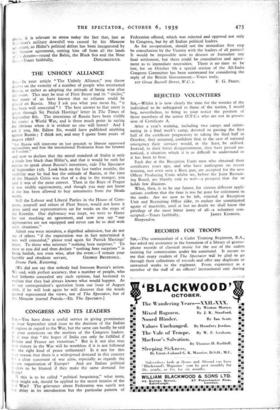CONGRESS AND ITS LEADERS
SIR,—You have done a useful service in giving prominence in your September 22nd issue to the decision of the Indian Congress in regard to the War, but the same can hardly be said of your comments on the motives of the Congress leaders. It is true that "the hopes of India can only be fulfilled if Britain and France are victorious." But is it not also true that victory in the War will be worthless if it is not followed by the right kind of peace settlement? Is it not for this %cry reason that there is a widespread demand in this country for a clear statement of war aims, especially as regards the future organisation of Europe? And are Indian political le iders to be blamed if they make the same demand for India?
If this is to be called " political bargaining," what term, they might ask, should be applied to the secret treaties of the War? The grievance about Federation was surely not vie delay in its introduction but the particular pattern of Federation offered, which was rejected and opposed not only by Congress, but by all Indian political leaders.
As for co-operation, should not the immediate first step be consultation by the Viceroy with the leaders of all parties? It would be impossible now to discuss or formulate any final settlement, but there could be consultation and agree- ment as to immediate necessities. There is no time to be lost, for on October 7th a special session of the All-India Congress Committee has been summoned for considering the reply of the British Government.—Yours truly,
107 Great Russell Street, W.C. z. F. G. PRATT.


































 Previous page
Previous page